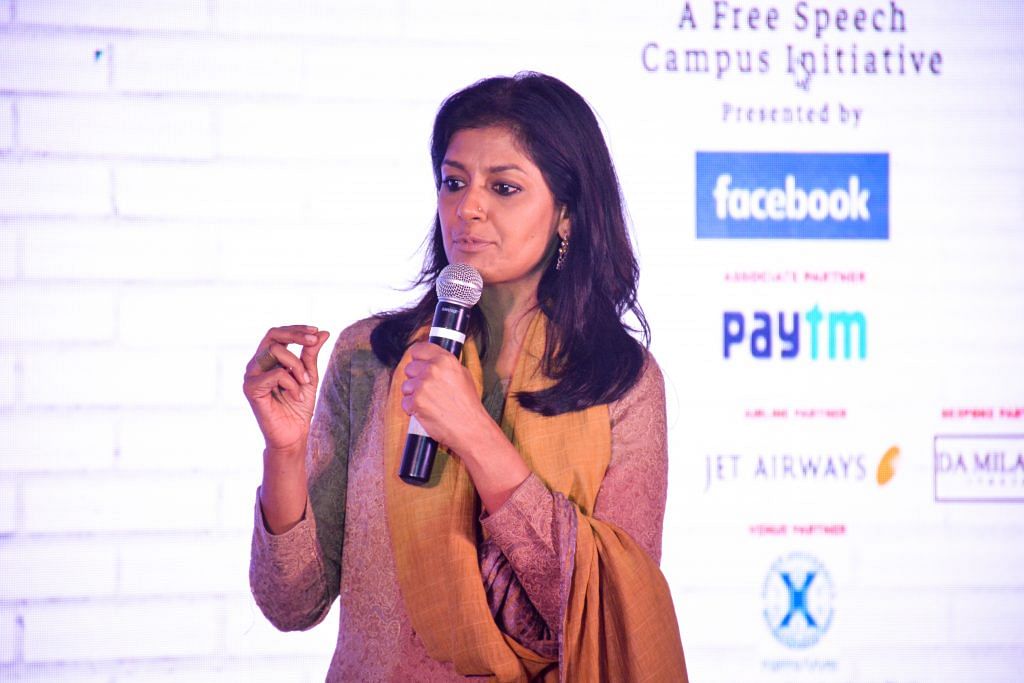Speaking about the inspiration behind her directorial ventures Firaaq and Manto, Das said she ‘wanted to respond to what was happening around us’.
New Delhi: “Anything worth saying today is going to be provocative.”
That’s what actor-director Nandita Das, who is synonymous with thought-provoking, socially-conscious movies like Fire, Earth, Firaaq and Manto, believes.
At ThePrint’s latest Democracy Wall event at Bhubaneswar’s Xavier University, Das discussed what prompts her to make such movies, and also commented upon other important social issues.
Das was in conversation with ThePrint’s National and Strategic Affairs editor, Jyoti Malhotra.
Democracy Wall is a monthly free speech campus initiative organised by ThePrint in collaboration with Facebook. Politician Kalikesh Singh Deo, stand-up comedian Rajneesh Kapoor and rap artist Big Deal also conducted interactive sessions at the event.
Also read: Freedom of speech that Indians enjoy today never existed earlier: Meenakshi Lekhi
The struggle for identity
Speaking about the inspiration behind her directorial ventures Firaaq and Manto, Das said she “wanted to respond to what was happening around us”.
She spoke at length on the divisive nature of identities, and how this has always troubled her. “We are born with certain particular identities, and yet we are made to feel ashamed of them sometimes, made to feel proud of them sometimes. These specific identities are dividing us and creating a sense of ‘them and us’,” Das said.
Even Manto, she said, was born out of a helplessness in trying to understand the struggle for identity.
Quoting an incident from the life of Saadat Hassan Manto, who never practiced any religion, Das said during Partition, he bought two caps — a Hindu cap and a Muslim cap. On being asked about them, he had said: “Jab mazhab dilon se utar ke sar pe chadh jaye to topiyan pehenni padti hain.”
Das translated this as “when religion comes out of our hearts and becomes a marker, then we have to wear caps”.
She stressed upon the need to move beyond these identities and have interactions that are more human.
Also read: Nandita Das’ Manto is a befitting reply to Sunny Deol’s Gadar-like jingoism
On the #MeToo Movement
Das has been in the spotlight during India’s #MeToo movement, because her father, artist Jatin Das, has been accused by at least a dozen women of sexual misconduct and harassment. She has said “truth will prevail”, but has continued to insist that all voices must be heard.
Asked about the #MeToo movement Friday, she reiterated her stance, and said it was important to ensure that the movement is sustained. She accepted that some cases might be “collateral damage”, but said: “It’s a nuanced kind of thing, but at this point of time we just have to hear people who are talking about their abuse, both men and women.”
She also said #MeToo shouldn’t be just about famous people; marginalised sections of society also needed to be included in it.
Also read: The women who are not for #Metoo in India
On the death penalty
Asked for her views on the death penalty, Das said it didn’t bring about justice. “Most progressive countries have already abolished it because it doesn’t bring about justice. What brings about justice is quick conviction. Delayed justice is no justice,” she said.
She also mentioned that sometimes mistakes are made in pronouncing a judgment, and if the death penalty is given, the mistake cannot be rectified.
